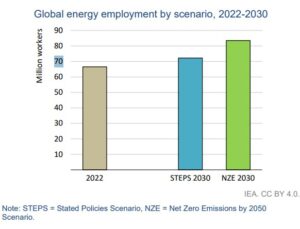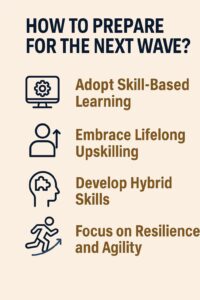

As we move into the 2030s, the global job landscape is transforming at break‑neck speed. Expanding digital connectivity is playing a key role in driving innovations that could reshape labour markets.
Among these, three technologies are expected to have the most significant influence: robotics and automation, advancements in energy generation and storage, and artificial intelligence with advanced data processing.
These advancements are reshaping both existing roles and creating entirely new ones. Staying ahead means understanding where opportunity lies and what skills will power it.
For professionals and students alike, understanding which careers are set to grow can provide a clear edge in planning for the future. In this blog, we explore some of the most promising and fast-growing career paths that are expected to shape the next decade.
Global demand for AI and machine learning positions remains on the rise. In the first quarter of 2025, the United States posted 35,445 vacancies in the AI field – an increase of 25.2% from Q1 2024 and 8.8% higher than the previous quarter.
Beyond the growth in vacancies, AI roles are gaining strategic importance and offering higher pay, with the median annual salary reaching $156,998 in Q1 2025, up 0.8% from the previous quarter.
Roles such as AI/ML Engineer are among the fastest-growing, showing over 40% growth from the previous year, and this trend is mirrored across regions and industries.
Read more: How AI is changing the job market
As organisations accumulate ever-larger data sets, the need for data scientists and analysts has intensified. In the US, the number of data scientist roles is expected to grow by around 35-36% by 2032, making it one of the country’s fastest-growing occupations. In the US, median salaries for data scientists often exceed $150,000 annually (around £125,000), marking it among the top global pay.
In the European Union, demand for data scientists is rising sharply, driven by rapid digital transformation and the adoption of big data analytics.
In the UK, average data scientist salaries in 2025 are around £67,000, ranging roughly from £50,000 at entry-level to over £90,000 for experienced professionals, with London salaries reaching averages of £85,000 to £100,000.
With digital threats on the rise, cybersecurity has become a top priority for employers around the world. The need for skilled professionals, including analysts and identity managers, continues to exceed the available talent pool. Globally, these roles are evolving rapidly, driven by increasing security risks and the growing importance of regulatory compliance.
Driven by international net-zero targets and sustainability policies, careers in green energy and environmental engineering are among the most dynamic.

The renewable energy sector is projected to see job increases of up to 70% by 2030 in leading markets, with salaries for engineers often ranging from £50,000 to £90,000.
The demand for ‘green jobs’ on platforms like LinkedIn is growing at double the pace of available talent, underscoring significant opportunities within this sector.
Globally, the healthcare informatics market size is expected to reach over USD 127 billion by 2034.
The healthcare sector is rapidly digitising, with roles in bioinformatics, health IT, and medical analytics seeing strong growth. This growth is supported by increasing government investments, technological innovation, and rising healthcare data availability.
Mid-to senior-level health informatics professionals in developed markets can expect competitive salaries aligned with the field’s technical importance and demand.
Educational technology is reshaping schools and professional training. Careers such as immersive learning designer and EdTech product developer are expanding, driven by the adoption of virtual and augmented reality, and the digitalisation of traditional curricula. Educational technology roles are among the fastest-growing in 2025.
Though still emerging, quantum computing roles are growing rapidly as the technology advances and industry adoption expands. The global quantum computing market is projected to grow from about $22 billion in 2024 to nearly $292 billion by 2035, representing a compound annual growth rate (CAGR) of around 26.5% during this period.
This growth is driven by increasing investments, hardware innovations, and expanding applications across sectors like pharmaceuticals, finance, and cybersecurity.

As the world of work evolves, employers are prioritising skills over traditional degrees, especially in fast-growing sectors such as artificial intelligence, renewable energy, and technology. This shift reflects a need for agile talent who can adapt to emerging roles and thrive in a rapidly changing marketplace.
Skill-based hiring is gaining ground globally. Major employers now focus on real-world competencies such as coding, data analytics, and digital marketing over credentials.
Top companies are already conducting capability assessments and portfolio-focused hiring. Online learning platforms have made it easier than ever for individuals to gain in-demand skills and present themselves based on capability, not just qualifications.
Learn more: The Future of Skills-based Education in Universities
Today, the importance of lifelong learning has become more evident than ever.
By 2030, nearly 60% of the global workforce will require new skills to meet evolving job demands, according to the World Economic Forum.
Lifelong learning through massive open online courses (MOOCs), micro-credentials, apprenticeships, and vocational training ensures professionals can stay relevant, move into new roles, and avoid redundancy. Analytical thinking, AI and big data, and technological literacy are among the most sought-after competencies.
The most desirable employees are those who blend technical expertise with strong soft skills. Employers across sectors increasingly seek professionals who pair programming, analytics, or digital proficiency with communication, creativity, problem-solving, and adaptability.
A LinkedIn survey found that 9 out of 10 global executives agree that soft skills are more important than ever. So, it’s not surprising that communication ranks top in the list of overall most in-demand skills. Workers with these “hybrid” profiles are more resilient to automation and enjoy greater job security and advancement.
Resilience, adaptability, and digital fluency have emerged as essential traits for future-ready talent. The ability to absorb change, recover from setbacks, and leverage digital tools is key to thriving in uncertain times.
The World Economic Forum lists resilience and agility among the top professional skills needed by 2030. Digital fluency, the capacity to use technology creatively and strategically sets candidates apart and drives organisational success.
Suggested: How Universities are Adapting to the Changing Job Market
The emerging career fields of the next decade promise growth, impact and strong earnings, but they demand flexibility, awareness and ongoing learning. Whether you aim for technology, sustainability, healthcare or education, aligning your skills with these trends will future‑proof your career.
The fastest-growing careers include Big Data Specialists (expected 110% growth), FinTech Engineers (95%), AI and Machine Learning Specialists (85%), Software and Applications Developers (60%), Security Management Specialists (55%), and Renewable Energy Engineers (40%) by 2030, according to the World Economic Forum.
Structural shifts driven by technology and macroeconomic trends will create 170 million new jobs (about 14% of current global employment) and displace 92 million jobs (8%), resulting in a net gain of 78 million jobs or 7% growth by 2030.
Clerical and secretarial jobs, including cashiers, administrative assistants, and data entry clerks are projected to see the largest declines, while new technology and green-transition roles rise.
Skills related to AI, big data, cybersecurity, technological literacy, creativity, resilience, and adaptability are identified as top priorities by employers, with 39% of the current workforce’s skills expected to change by 2030.
Yes, frontline roles such as construction workers, nursing professionals, educators, delivery drivers, and personal care workers will see significant absolute job growth, alongside technology-centric roles.
Absolutely. With technology and market demands changing rapidly, continuous upskilling and adaptability are critical for sustaining employability and career advancement in the next decade.